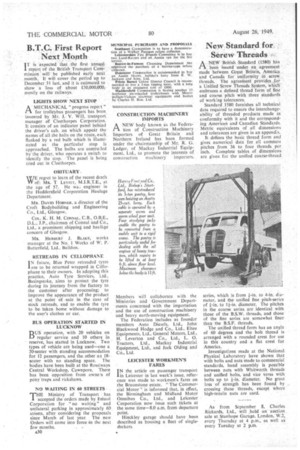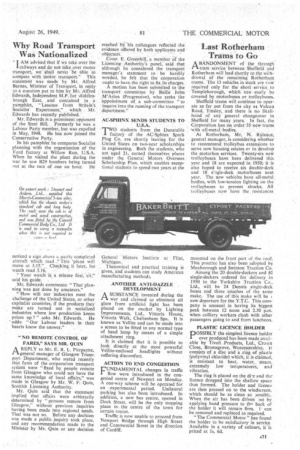L.T.C. First Report
Page 32

Page 33

If you've noticed an error in this article please click here to report it so we can fix it.
Next Moth I T is expected that the first annual report-of the British Transport Commission will be published early nein month. It will cover the period up to December 31 last, and it is estimated to show a loss of about £30,000,000, mostly on the railways.
LIGHTS SHOW NEXT STOP
A MECHANICAL "progress repoet " tA for trolleybus passengers has been invented by Mr. J. V. Will, transport manager of Cleethorpes Corporation. It consists of an indicator panel behind the driver's cab, on which appear the names of all the halts on the route, each flanked by a red bulb which is illuminated as the particular stop is approached. The bulbs are contro led by the driver, who operates a switch to identify the stop. The panel is being tried out in Cleethorpes.
OBITUARY.
[WE regret to learn of the recent death VV of: MRT LEV1Tr, '114.I.R.T.E., at the age of 57. He wa; engineer in the Huddersfield Corporation Haulage Department.
MR. DAVID HORNER, a director of the Croft Bodybuilding and Engineering Co., Ltd., Glasgow.
COL. K. H. M. CONNAL, C.B., 0.13,E., D.L., J.P., chairman of Connal and Co., Ltd., a prominent shipping and haulage concern of Glasgow.
MR. HERBERT J. BLAKE, Works manager at the No. I Works of W. P. Butterfield, Ltd.. Baildon.
RETREADS IN CELLOPHANE I N future, Blue Peter retreaded lyres are to be returned wrapped in Cellophane to their owners. In adopting this practice, Auto Tyre Services, Ltd., Basingstoke, aims to protect the tyre during its journey from the factory to the customer after processing; to improve the appearance of the product at the point of -sale in the case of stock retreads, and to enable the tyre to be. taken home without damage to the user's clothes or car.
BLS OPERATION STARTED IN LUCKNOW
Dus operation, with 20 vehicles on regular service and 10 others in reserve, has started in Lucknow. Two
types of vehicle are being used—one a 30-seater with standing accommodation for 12 passengers, and the other an 18seater with no standing space. The bodies have been built at the Roadways Central Workshop, Cawnpore. There has been opposition from ownes of pciny traps and rickshaws.
NO WAITING IN 60 STREETS
THE Ministry of Transport has accepted the orders made by Bristol Corporation for "no waiting" and unilateral parking in approximately 60 streets, after considering the proposals since March of last year, The new Orders will come into force in the next
few months. . A30 CONSTRUCTION MACHINERY IMPORTS
l–I A NEW body known as the Federation of Construction Machinery Importers of Great Britain and Northern Ireland has been formed under the chairmanship of Mr. R. G. Ledger, of Mackay Industrial Equipment, Ltd.. to promote the interests of construction machinery importers.
Members will collaborate with the Ministries and Government Departments concerned with the importation and the use of construction machinery and heavy earth-moving equipment.
The Federation includes as founder members Auto Diesels. Lid., John Blackwood Hodge and Co., Ltd., Eltee Equipments, Ltd., General Motors, Ltd., H. Leverton and Co., Ltd., L. 0. Tractors, Ltd., Mackay Industrial Equipment, Ltd.., and Jack Olding and Co., Ltd.
LEICESTER WORKMEN'S FARES
I N the article on passenger transport in Leicester in last week's issue, reference was made to workmen's fares on the Braunstone estate. "The Commercial Motor" is informed that, in effect, the Birmingham and Midland Motor Omnibus Co., Ltd., and Leicester Corporation now issue such tickets at the same time-8.0 a.m. from departure point.
Hinckley garage should have been described as housing a fleet of singledeckers.
New Standard for Serevir Threads
A NEW British Standard (1580) has
been issued under an agreement made befWeen Great Britain, Amerio. and Canada for uniformity in screw threads. The agreement provides for a Unified Screw Threads System, which embraces a defined thread form of fine and coarse pitch with three standards of working tolerances.
Standard 1580 furnishes all technical data required to ensure the interchangeability of threaded products made in conformity with it and the corresponding American and Canadian Standards. Metric equivalents of all dimensions and tolerances are given in an appendix.
It defines the basic thread form and gives numerical data for all common pitches front 36 to four threads per. inch. Complete tables of dimensions are given for the unified coarse-thread
series, which is from +-in. to 4-in, diameter, and the unified fine pitch-series of On. to I On. diameter. The pitches in the coarse series are identical with those of the B.S.W. threads, and those of the fine series are somewhat finer than the B.S.F. threads.
The unified thread form has an angle. of 60 degrees and the bolt thread is arranged with a rounded crest for use in this country and a flat crest for America.
Investigations made at the National Physical Laboratory have shown that with bolts and nuts made to commercial standards, hand assembly is possible between nuts with Whitworth threads and unified bolts, and vice versa with bolts up to Fin. diameter. No great loss of strength has been found by _ crossing these threads, except where high-tensile nuts are used.
As from September 8, Charles Rickards, Ltd., will ,hold an auction sale at Stanhope Garage, London, W.2. every Thursday at 4 p.m., as well as every Tuesday at 2 p,m.
Why Road Transport Was Nationalized
"
'AM advised that if we take over therailways
and do not take over motor transport, we shallneve' be able to compete with motor transport." This statement was made by Mr. Alfred Barnes, Minister of Transport, in reply to a question put to him by Mr. Alfred Edwards, Independent M.P. for +fiddlesbrough East, and contained in a pamphlet, " Lessons from Britain's Socialist Experiment," which Mr.. Edwards has recently published.
Mr. Edwards is a prominent opponent of the Steel Bill. Formerly he was a Labour Party member, but was expelled in May, 1948. He has now joined the Conservative Party.
In his pamphlet he compares Socialist planning with the organization of the Ford factory at Willow Run, U.S.A. When he visited the plant during the war he saw B29 bombers being turned out at the rate of one an hour. He noticed a sign above a partly completed aircraft which read •" This 'plane will move at 3.15." Checking it later, his watch read 3,16. , " Your watch is a iriinute fast, sit," said his guide.
Mr. Edwards comments: "That planning was not done by amateurs."
"How will our industries meet the challenge of the United States, or other capitalist countries, if the products they make are turned out in socialized industries where low production keeps prices up " asks .Mr. Edwards. He adds: "Our Labour leaders in their hearts know the answer."
"NO REMOTE CONTROL OF FARES," SAYS MR. QIUIN
AREPLY to Mr. E. R. L. Fitzpayne, general manager of Glasgow Transport Department, who stated recently that fares of the corporation transport system were "fixed by people remote from Glasgow who could not have the same knowledge of local affairs," was made in Glasgow by Mr. W. F. Quin, Scottish Licensing Authority.
Mr. Quirt said that the statement implied that affairs were arbitrarily determined by "persons remote from Glasgow," without previous inquiries having been made into regional needs. That was not so. Before any decision was made a public inquiry took place, and any recommendation made to the Minister by Mr. Quin or any decision reached by his colleagues reflected the evidence offered by both applicants and objectorS.
• Coon. E. Greenhill, a member of the Licensing Authority's panel, said that although he considered the transport manager's statement to be harshly worded, he felt that the corporation ought to have the right to fix its charges.
A motion has been submitted to the transport committee by Bailie John ,M'Aslan (Progressive), who seeks the appointment of a sub-committee "to inquire into the running of the transport department."
AC-SPHINX SENDS STUDENTS TO
I0 students from the Dunstable factory of the AC-Sphinx Spark Plug Co. are shortly leaving for the United States on two-year scholarships in engineering, Both the students, who are aged 21, earned themselves places under the General Motors Overseas Scholarship Plan, which enables exceptional students to spend two years at the
General 'Motors Institute -at Flint, Michigan.
Theoretical and practical training is given, and students can study American manufacturing methods.
ANOTHER ANTI-DAZZLE DEVELOPMENT
A SUBSTANCE invented during the
war and claimed to eliminate all glare from artificial light has been placed on the market by Lighting Improvements, Ltd., Vittoria House, Vittoria Walk, Cheltenham Spa. It is known as Vellite and can be made into a screen to be fitted to any normal type of head lamp by means of a simple attachment ring, It is claimed that it is possible to look directly at the most powerful Vellite-enelosed headlights without suffering discomfort.
ACTION TO END CONGESTION
FUNDAMENTAL changes in traffic flow were introduced in the congested centre of Newport on Monday. A one-way scheme will be operated for an • experimental period. Unilateral parking has also been introduced: In addition, a new bus centre, opened in Dock Street, will be the only stopping place in the centre of the town for certain routes.
Traffic is now unable to proceed from Newport Bridge through High Street and Commercial Street in the direction of Cardiff.
Last Rotherham Trains to Go
ABANDONMENT of the through ritram service between Sheffield and Rotherham will lead shortly to the withdrawal of the remaining Rotherham trams. The 13 vehicles in stock are row required only for the short service to Templeborough, which can easily be covered by motorbuses or trolleybuses.
Sheffield trams will continue to operate as far out from the city as Vulcan Road, Tinsley, and there is no likelihood of any general changeover in Sheffield for many years. In fact, the Corporation has on order 35 new trams with all-metal bodies.
At Rotherham, Mr. N. Rylance, general manager, is considering whether to recommend trolleybus extensions to serve new housing estates or to develop the motorbus services. Twenty-six new trolleybuses have been delivered this year and 18 are expected in 1950; it is also hoped to receive six double-deck and 18 s'agle-deck motorbuses next year. The new vehicles have all-metal bodies, with low-tension lighting on the trolleybuses to prevent shocks. All trolleybuses now have the resistances mounted on the front part of the roof. This practice has also been adopted by Mexborough and Swinton Traction Co.
Among the 20 double-deckers and 80 single-deckers ordered for delivery in 1950 to the Yorkshire Traction Co., Ltd., will be 24 Dennis single-deck buses and three coaches of the same make. The use of this make will be k new departure for the Y.T.C. This company is unusual in having its biggest peak between 12 noon and 2.30 p.m. when colliery workers clash with other passengers going to and from luncheon.
PLASTIC LICENCE HOLDER DOSSIBLY the simplest licence holder
ever produced has been made available by Tivoli Products, Ltd., Crown Close, Bromsgrove, ,Worcestershire. It consists 'of a disc and a rills of plastic (polyvinyl chloride) which, it is claimed, is resistant to heat, water, steam, extremely low temperatures, a n vibration.
The ring is placed on the di-c and the licence dropped into the shallow space thus formed. The holder and licence are then pressed on to the windscreen, which should be as clean as .3ossible. When the air has been driven 3ut by applying hand pressure to aro back of 'the holder it will remain firm. f can be removed and replaced as required.
"The Commercial Motor" has found the holder to be satisfactory in service. Available in a variety of colours, it is priced at Is. 6d.




















































































